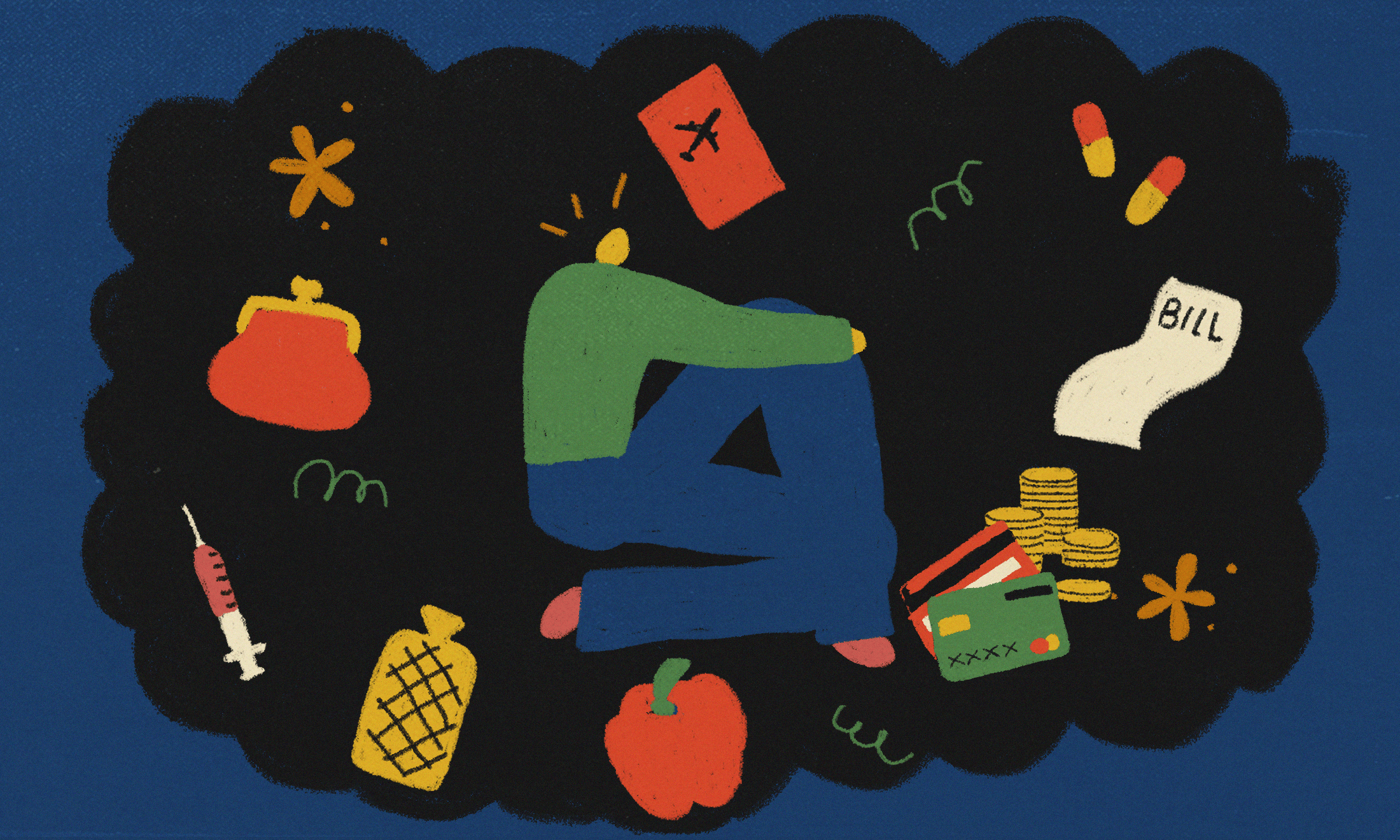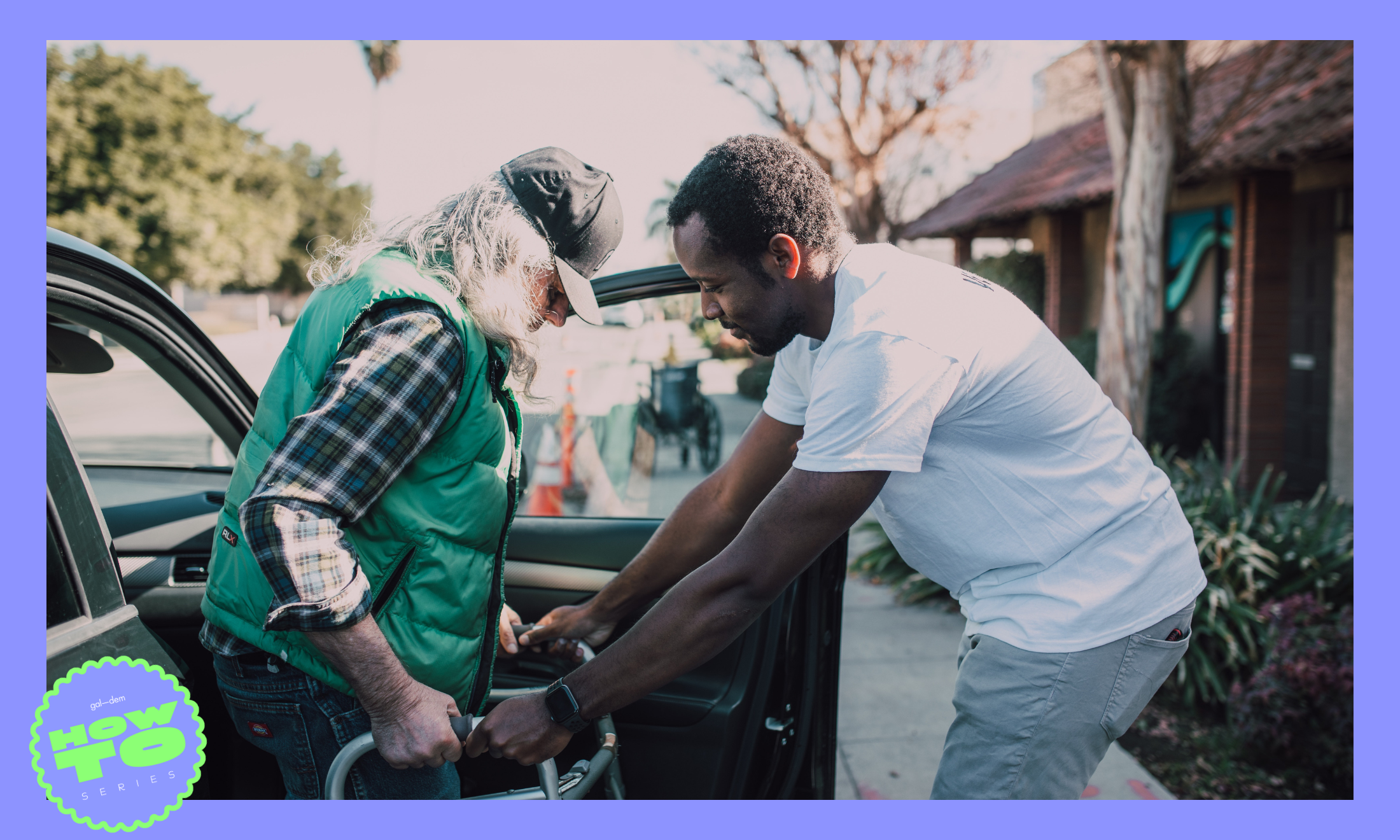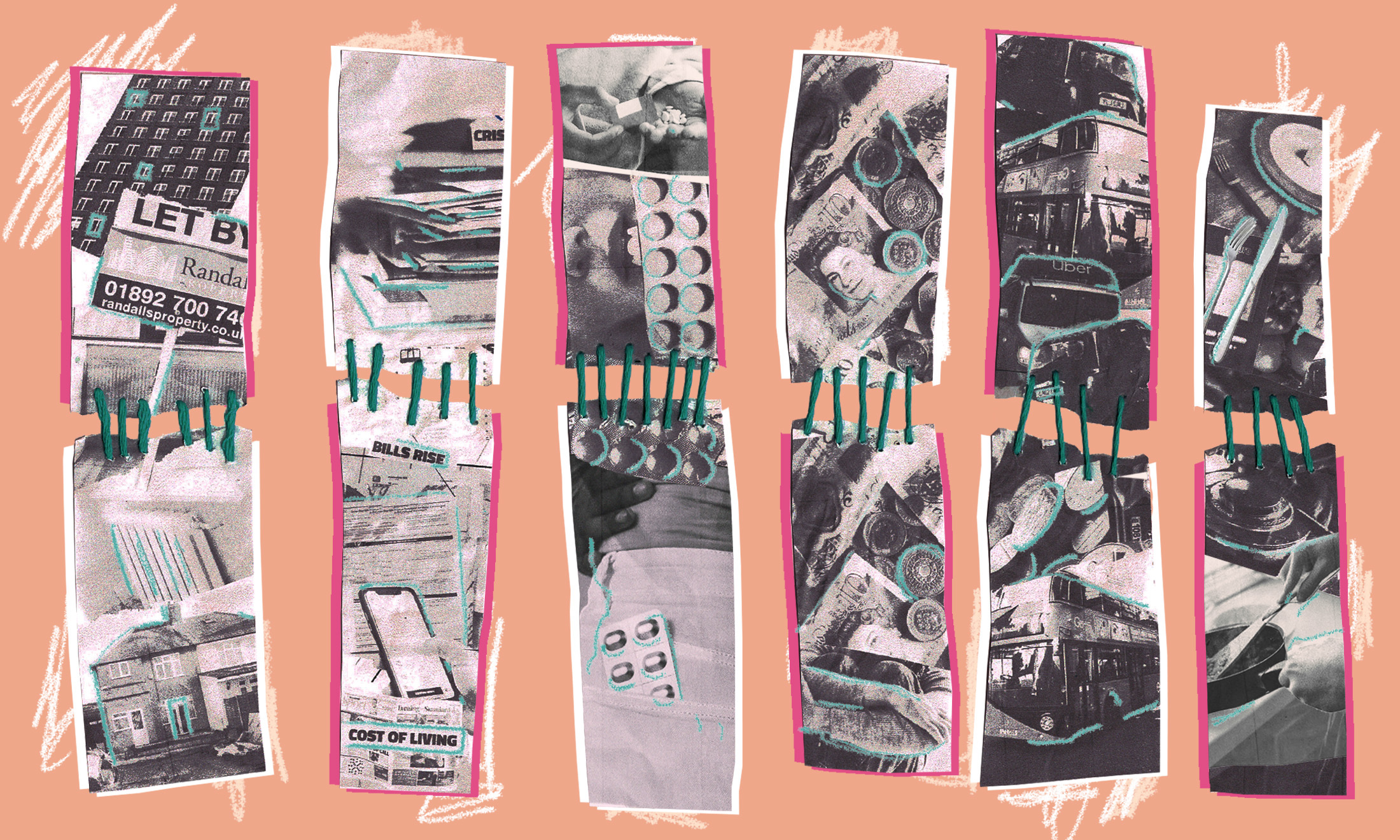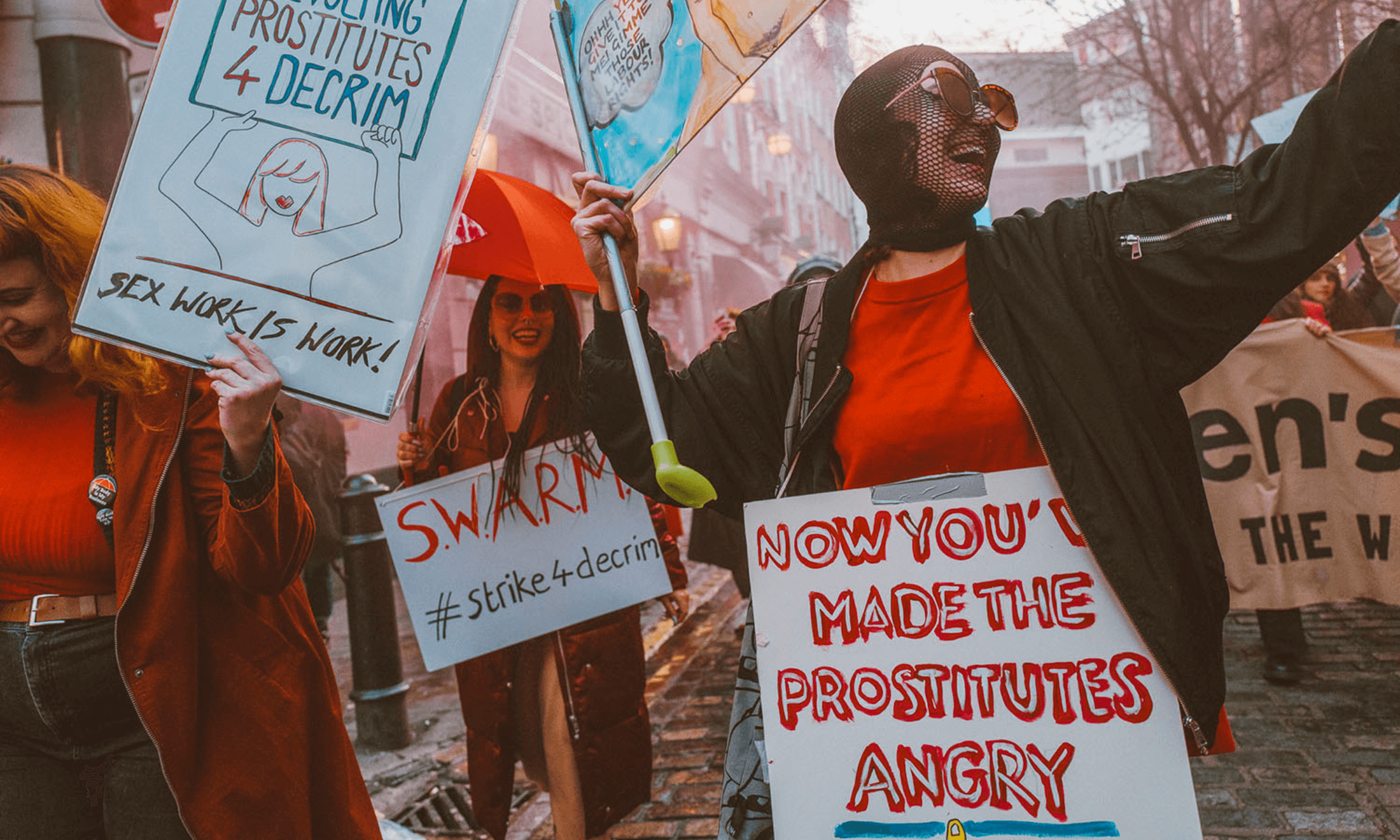How the cost of living crisis is forcing LGBTQ+ people to make impossible choices
Rising costs in the UK are forcing LGBTQ+ people of colour to return to abusive households and families, and leaving many with an impossible choice between prioritising food, heating, and medical treatment.
Prishita Maheshwari-Aplin
07 Mar 2023

Sage Anifowoshe
Content warning: Mentions of abuse, transphobia, murder/suicide, conversion therapy
It has been eight years since Koi came out as trans-masc to a group of close friends, but inaccessible costs have delayed doctors’ appointments since he decided to proceed with medical transition three years ago. Now, aged 21, he has finally booked gender-affirming top surgery for this summer. However, rising food, bills, and transport costs are once again placing an unforeseen burden on his – and his peers’ – futures. “Being trans right now is very difficult. We’re put in a position of either prioritising food and bills or medical treatment”, he says.
Koi, an ambassador for LGBT+ charity Just Like Us, is just one of countless LGBTQ+ people in the UK disproportionately experiencing the cost of living crisis. From family rejection and street violence, to workplace discrimination and reduced access to support services, LGBTQ+ individuals already face additional barriers to navigating the world with safety and security.
“Being trans right now is very difficult. We’re put in a position of either prioritising food and bills or medical treatment”
Koi, 21
The current economic crisis, on top of years of austerity, has made life gruelling for many. “I have a lot of friends that cannot afford to continue hormone treatment or speak to specialists due to the current economy,” they share. “It’s difficult because I’ve worked so hard the past few years to save for life-changing surgery yet, after the operation, I’ll be straight back to working to survive again.”
‘Going without the basics’
“LGBTIQ+ people are definitely going without the basics. We have people attending our LGBTIQ+ Centre who are safely housed but can’t afford to keep the heating on, cook a hot meal, or take a shower”, says Carla Ecola, co-founder and managing director of The Outside Project, a London-based LGBTIQ+ community shelter, centre, and domestic abuse refuge.
The current economic crisis has exacerbated existing issues for these communities.
LGBTQ-specialist support services have been dropped with cuts to local authority budgets. Health and housing services used by queer people have been devastated. At the same time, social spaces, such as gay bars and venues – which provide much-needed safety and community for vulnerable members of the community – have been shutting down due to soaring rents. with accessible, affordable, and safe housing, especially in big cities like London – places where queer people tend more readily to find community and belonging.
Many are being pushed out of safe spaces due to rising rent on private housing and soaring utility bills, and relying on emergency hostels and shelters. But with mainstream housing services often perpetuating further homophobia and violence, and a severe lack of specialist support due to funding cuts, LGBTQ+ people are being – literally – left out in the cold. Currently LGBTQ+ youth account for 24% of the UK’s youth homelessness population.
“Our community is more likely to have an insecure tenancy because of needing to find an LGBTIQ+ friendly house share or landlord,” Carla adds, explaining that they’ve seen queer house shares fall into states of disrepair because tenants cannot afford to heat them properly, or to flag issues with their landlords out of fear of increasing rents and eviction. “We’ve had to move people into emergency hotel rooms because of no heating, dodgy electrics, or being sick from black mould. I’ve never seen as many photos of black mould as I have this winter.”
Not only are LGBTQ+ people at greater risk for unemployment, but studies have also revealed that queer professionals continue to experience discrimination in the workplace, with 2019 research showing that LGBTQ+ people were earning 16% less than their cis-hetero counterparts. This – combined with an increase in hate crimes and rampant transphobia in the media – has created an environment where LGBTQ+ people in the UK feel further marginalised, isolated, and abandoned.
The impact of multiple marginalisations
Although the current crisis is impacting countless queer people, it is evident that holding multiple intersectional marginalised identities would multiply this burden. Koi also highlights the impact of appearance-based prejudice, such as that based on racism or visible transness, sharing that his “PoC queer friends are struggling more than our white counterparts”.
LGBTQ+ migrants and refugees face a unique predicament in that many are unable to work and earn money while attempting to seek refuge in the UK. Not only have they been forced to flee abusive homes and countries where their lives and freedoms may be in danger, they may then have to rely on mutual aid funds purely to survive while they await the Home Office’s decision – a process that is already “intrusive and degrading”.
Lorelai is a trans woman seeking asylum in the UK. Back home in India, Lorelai survived a doxxing of her private social media account, and resisted attempts of conversion therapy – a form of treatment or psychotherapy that seeks to change, “cure”, or suppress the sexual orientation and/or gender identity of a person, and that disproportionately impacts people of colour. However, when she was accepted to study at the University of Glasgow for a postgraduate degree, her parents blocked her scholarship applications and instead offered to finance her postgraduate course on three conditions: to stay in touch; to regularly share her bank statements; and to not be trans.
“If I expressed myself in a feminine manner, she [her mother] would beat me up and sometimes lock me up in a room without food or water for days”, Lorelai shares. “She literally said that she’ll kill me, then kill herself and my father, and burn the whole house down. I made a very firm decision that, as soon as I graduated from uni, I would leave in some way or another.” Lorelai ultimately fled India to escape emotional and physical abuse at the hands of her mother in direct response to her trans identity.
Once in Glasgow, Lorelai introduced herself as her true self and has since “accomplished a social transition” – finding an accepting queer community and serving as the PoC officer of the university’s LGBT society. She was slowly growing into herself, and finding support and happiness. However, due to extensive waiting lists for trans healthcare and affirming surgeries, Lorelai’s parents stopped supporting her financially before she was able to make progress with her transition.
“In Glasgow, the gender identity clinic has a waiting list of five years. They were only taking patients who had been referred back in 2018.” Lorelai adds that she was even unable to continue accessing the hormones prescribed to her in India by GPs.
“Back in my home country the biggest barriers to my transition were my parents and society. Here, it’s the NHS collapsing in on itself”
Lorelai
Left with a choice between returning to an abusive home and a country where she could not be herself, and seeking asylum in the UK, Lorelai proceeded with the latter in April 2021. However, she tells gal-dem that the Home Office accused her of deception because she had not claimed asylum at first entry into the country, revoked her right-to-work visa, and rejected her application. Now, she has been forced to pause her transition and is instead channelling community funds into appealing the Home Office’s decision.
“Back in my home country the biggest barriers to my transition were my parents and society. Here, it’s the NHS collapsing in on itself. And it’s also the Home Office, because they’re preventing me from having an active source of income.”
Stepping in where the state is failing
Like Lorelai, many LGBTQ+ people don’t have the choice to simply return to their family homes during periods of financial insecurity – even if not facing the additional challenges that come with holding migrant status. While specialist services, like The Outside Project, are working hard to fill a significant gap in LGBTQ+ safe spaces, new figures from LGBT+ anti-abuse charity Galop suggest that LGBTQ+ people experiencing abuse and violence are still at greater risk of being exposed to harm during the cost-of-living crisis. Galop also reported a record-breaking 227% increase in the use of their emergency fund between June and November 2022 to help support survivors with resources such as food, transport, and clothing, compared to the same period in 2021.
“Survivors are returning to perpetrators because they are unable to support themselves financially,” one Galop frontline worker said in a statement.
As always, the LGBTQ+ community is organising to fill the gaps left by insufficient structural support – through mutual aid fundraisers and resource-sharing. Abandoned by the system, Lorelai’s friends have pulled through, with the LGBT society and local co-op bar, Porsche, organising fundraising events in solidarity. And Koi’s friends regularly feed one another and share clothes.
“Something that gives me hope is community,” he says. “Being part of a chosen family fills you with warmth.”
However, without targeted support provided by the government and public bodies, LGBTQ+ people fear they will continue to be exposed to further harm.
“The only way this situation will improve is if local frontline workers and the community work together to do something about it,” says Carla. “We’re happy to help where we can.”
And this help is even more urgent within the context of Britain’s current moment, in which the Tory government and right wing press are whipping up hatred against trans people. “I feel that not enough is being done to support trans and non-binary people in the current times,” says Lucas, a 22 year old bisexual trans man. “There is more of a focus on debates about the legitimacy of our identities and needs instead of a focus on the matters that are important.”
With reporting by June Bellebono
For more information, here’s a list of organisations and groups that support and advocate for the needs of LGBTQ+ people in the UK:
- The Outside Project
- Just Like Us
- Not A Phase
- Rainbow Migration
- Stonewall Housing
- Black Trans Alliance
- Gendered Intelligence
- WeExist
- Five for Five
- Mermaids
The contribution of our members is crucial. Their support enables us to be proudly independent, challenge the whitewashed media landscape and most importantly, platform the work of marginalised communities. To continue this mission, we need to grow gal-dem to 6,000 members – and we can only do this with your support.
As a member you will enjoy exclusive access to our gal-dem Discord channel and Culture Club, live chats with our editors, skill shares, discounts, events, newsletters and more! Support our community and become a member today from as little as £4.99 a month.

Britain’s policing was built on racism. Abolition is unavoidable

How Pakistan’s Khwaja Sira and transgender communities are fearing and fighting for their futures

Their anti-rape performance went viral globally. Now what?





